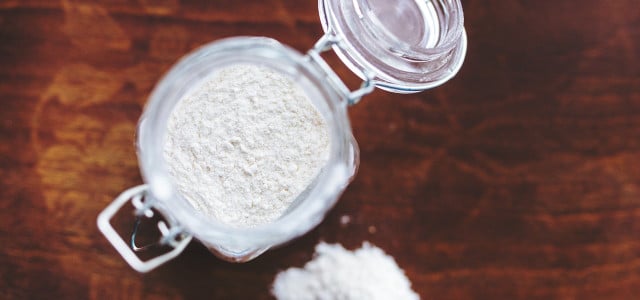
Xanthan gum is found as an additive in many foods. But is xanthan gum dangerous for your health? Here we explain what purpose the substance serves in food and cosmetics and whether it is questionable.
Xanthan gum (E 415) is a polysaccharide, i.e. a multiple sugar. These are carbohydrates that contain a variety of simple sugars. However, due to its structure, xanthan gum is not broken down by your body like any normal sugar: xanthan gum is a soluble fiber that binds water and is broken down by intestinal bacteria into fatty acids and gases. Such soluble fiber is mainly found in various types of fruit and vegetables.
Xanthan gum is created when sugar is fermented with the help of bacteria. It initially has a consistency like gelatin, but by adding alcohol the substance becomes solid again and then turned into powder. Xanthan gum is mainly used as a stabilizer or thickening and gelling agent.
Xanthan gum in food and cosmetics

(Photo: CC0 / Pixabay / lounisais)
Xanthan gum is found in numerous products because it is inexpensive and can gel or thicken both foods and care products.
In food:
- Baked goods (makes the dough elastic and prevents bread from going stale)
- Jams and fruit jellies
- Fruit juices (keeps suspended solids evenly distributed)
- Ice cream (reduces the formation of ice crystals)
- Ready-made sauces such as ketchup, mayo and mustard (thickens them, gives them good flowability)
- salad dressings
- gluten-free products
- Low-fat products
Xanthan gum is also widely used in molecular gastronomy because it makes various foods viscous and therefore easier to shape.
In care products and cosmetics, xanthan stabilizes and binds substances that cannot actually be mixed (emulsifier):
- toothpaste
- creams and lotions
- shampoo
- Liquid soaps
- Mascara (mascara)
- Lubricant
Due to its acid and heat stability, it is widely used in industrial products:
- Coatings
- binder
- Colors
- Cleaning products
- Adhesives, wallpaper paste
- Polishing agent
- ink
- Explosives
Xanthan gum – healthy or dangerous?

(Photo: CC0 / Pixabay / PublicDomainPictures)
Xanthan gum is considered to be harmless to health. No allergies or intolerances have been identified so far. Xanthan gum even has some health benefits. Due to its abilities as a soluble fiber, it has effects on the intestines that can have positive effects on your entire body:
-
Lowers your blood sugar levels: In one study (albeit from 1985), patients with diabetes were given muffins laced with xanthan gum. After eating, their blood sugar and cholesterol were measured: both had decreased in all diabetics. In 2016, test subjects who ate xanthan gum with rice also had significantly lower blood sugar levels after half an hour than those who ate rice without xanthan gum.
-
Reduces cholesterol: Not only will your blood sugar and energy levels thank you, your heart can also benefit from xanthan gum. In men tested, blood cholesterol levels decreased by ten percent after 23 days of regular consumption of xanthan gum.
-
You’ll get full faster: By slowing down digestion, the test subjects in the muffin study got full quicker. This can also help you lose weight healthily.
-
Can prevent cancer: In tested mice, the addition of xanthan gum slowed the growth of malignant tissue. However, a study on humans has not yet been carried out.
-
Prebiotic effect: Since xanthan gum is a soluble fiber, it has a prebiotic effect on your intestinal bacteria. These can utilize prebiotics extremely easily, thus multiplying more quickly and fighting unhealthy bacteria better.
When to be careful with xanthan gum

(Photo: CC0 / Pixabay / derneuemann)
Despite its numerous positive effects on digestion, xanthan gum can also have undesirable effects in some people:
-
Laxative effect: If you suffer from constipation, xanthan gum can actually be helpful for you because it has a laxative effect. However, healthy people should be careful not to consume too many products containing xanthan gum.
-
Interaction with medication: If you suffer from diabetes and regularly take medication or inject insulin, you should seek medical advice before increasing your consumption. Because xanthan gum affects your blood sugar levels, this may affect your medication.
Read more at Utopia:
- Fructose: What you need to know about fructose
- Fiber in the diet: what are the best suppliers?
- Probiotic foods: You will find the most important ones in this list
Edited by Jennifer Watzek
** marked with ** or orange underlined Links to sources of supply are partly partner links: If you buy here, you are actively supporting Techzle\.com, because we then receive a small part of the sales proceeds. More info.